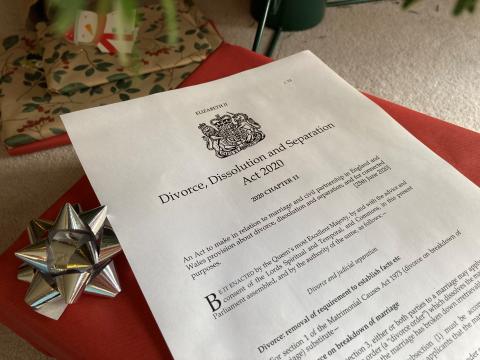All I want for Christmas is…someone else

Dr Andrew Gilbert, Senior Lecturer in Law, brings good tidings!..about the current divorce law.
Warning: This article contains gratuitous references to Christmas songs. How many can you spot?
It’s unlikely that Mariah Carey’s hit would have proved to be one of the most successful Christmas songs of all time if its title was like the title of this article. For some, Christmas is the most wonderful time of the year. Others may find that are they lonely this Christmas. Marriages often come under strain when a child is born, but conflict might be avoided for the sake of a silent night and an unhappy spouse may decide to stay another day, or month, or year for the sake of the children.
Family lawyers will tell you that the busiest time for new divorce cases is just after the festivities end. Some couples hang on to get through one last Christmas together for the sake of their children, whereas for others the experience of being together, largely confined indoors during a northern European winter, exposes irreparable cracks and proves the last straw.
What law are those 107,599 couples (latest figures from 2019) subject to when seeking to dissolve their union? Currently it’s a law written over fifty years ago, with its essence stretching back into the middle of the nineteenth century. The Matrimonial Causes Act 1973 (MCA 1973; based on the Divorce Reform Act 1969) states that divorce is only permitted where the marriage has irretrievably broken down and the person seeking the divorce can show that their spouse has committed adultery, or behaved badly*, or deserted them for at least two years, or consents to the divorce after being separated for at least two years, or the parties have been apart for five years. So you can’t get a divorce because the marriage is just, well, over, even if both parties agree that it is. Unless, of course, the parties can wait at least two years to use the other grounds, which is not always possible or desirable.
But – good tidings! – this is the last Christmas for our current divorce law because a new law comes into effect on 6 April 2022. It’s amazing really that the current, deeply flawed system has held on for so long. It came under severe criticism in a Law Commission report way back in 1990 and was set to be replaced by the Family Law Act 1996 but those reforms were later abandoned. Criticism intensified again a few years ago with research from the Finding Fault? project showing that the current system didn’t deter divorce and actually increased conflict between the parties and impacted negatively on children. Further (constitutionally correct, of course) calls for reform came from judges in the Supreme Court in the case of Owens v Owens in 2018. Not long after, without much fanfare, the government decided enough was enough and the end result is the Divorce, Dissolution and Separation Act 2020 which amends the MCA 1973.
Under the new law, a divorce can be sought by one party, or both jointly, based on a statement of irretrievable breakdown alone, i.e. there is no need to prove any of the 5 situations above. Overall, it’s a much more humane approach which is designed to reduce family conflict. The new law won’t produce peace on earth but it should at least enable couples to dissolve their marriages without the law itself making things worse.
* Technically, ‘behaved in such a way that the petitioner cannot reasonably be expected to live with the respondent’.
 Dr Andrew Gilbert
Dr Andrew Gilbert
Andrew joined the Open University as a Senior Lecturer in July 2020. He is currently involved in the production of the following modules: • W111 Criminal Law and the Courts • W230 Family Law • W321 Public and Criminal Law and Practice • W322 Private Client Law and Practice
